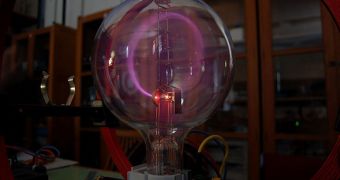For the first time ever, researchers finally established the question of whether electrons are perfectly spherical or not. It would appear that, just like everything else in nature, the elementary particles are not perfect spheres, but rather extremely close to it.
According to the researchers who conducted the new work, if an electron would be size of the solar system, then its imperfections would only measure the width of a human hair. For all intents and purposes, the particle is a sphere.
The investigation that arrived at this conclusion took 10 years to complete. The distance that separates electrons from being perfectly spherical is 0.000000000000000000000000001 centimeters, experts reveal, quoted by Wired.
Physicists from the Imperial College London (ICL), in the United Kingdom, are the ones who managed to arrive at this conclusion, after a long and difficult study on ytterbium flouride molecules.
Using highly-precise lasers, the ICL experts were able to take a closer look at the motion of electrons revolving around these molecules. They focused their attention on the wobble that the elementary particles might be displaying.
If such a wobble were to be detected, then this would have meant that electrons are not a perfect sphere. But, to the sensitive limit of the machine used, no wobble whatsoever was discerned.
“We’re really pleased that we’ve been able to improve our knowledge of one of the basic building blocks of matter,” team leader and study coauthor Jony Hudson explains.
“It’s been a very difficult measurement to make, but this knowledge will let us improve our theories of fundamental physics,” the ICL investigator adds.
“People are often surprised to hear that our theories of physics aren’t ‘finished’, but in truth they get constantly refined and improved by making ever more accurate measurements like this one,” he adds.
What the team plans to do next is to refine its measurements of these electrons ever further. This can be done by cooling the elementary particles down to absolute zero, and by devising a method of controlling their motions when this is achieved.
If experts manage to do this, then they will hit two birds with one stone. The properties electrons are established to have also extend on an antimatter particle called the positron, which is the positively-charged equivalent of an electron.

 14 DAY TRIAL //
14 DAY TRIAL //